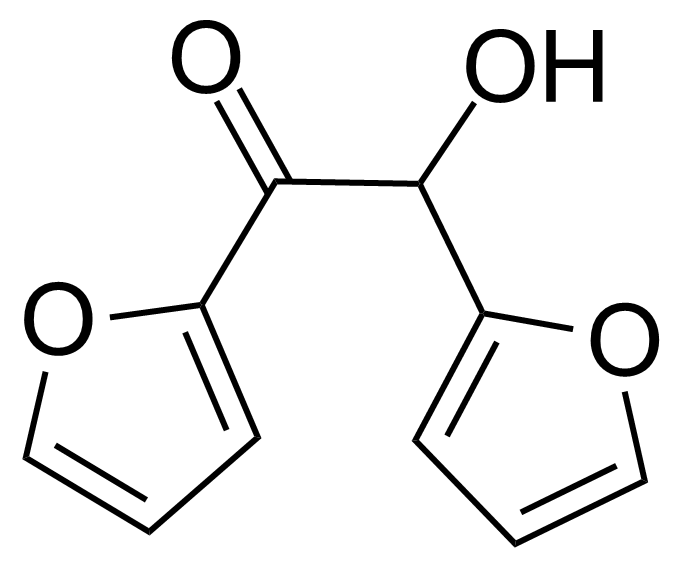 April 20, 2023
April 20, 2023Furoin – preparation and application
General description and preparation:
Furoin or 1,2-di(furan-2-yl)-2-hydroxyethanone [552-86-3] is a white crystalline solid with the melting point of 136-137 °C.[1]
It can be produced from furfural via benzoin condensation in presence of cyanide ion[2] or N-heterocyclic carbene catalyst as various thiazolium and imidazolium ions.[3] They can be further supported as a recyclable precatalysts, which upon treatment with a base, catalyze furfural self-condensation coupling reaction into furoin.[4]
Furoin synthesis from furfural is also catalyzed by vitamin B1 (thiamine). In 1957, Ronald Breslow proposed the mechanism of reaction that involves a relatively stable carbene form of thiamine, which was the first evidence for the existence of persistent carbenes.[5]
Application of Furoin:
Furoin can be used in synthesis of pyrazine and quanoxiline derivatives by condensation with diamines.[6] Different tetrasubstituted pyroles can be prepared from furoin as α-hydroxy ketone via a base-promoted three-component reaction with malononitrile and alcohols[7] or 1,3-dicarbonyls and ammonium acetate.[8]
Product categorization (Chemical groups):
Main category:
Second level:
Third level:
_______________________________________________________________________
[2] W. W. Hartman, J. B. Dickey J. Am. Chem. Soc. 1933, 55 (3), 1228. doi:10.1021/ja01330a063
[3] H. Sugimoto, K. Hirai Tetrahedron Lett. 1985, 26 (7), 883. doi:10.1016/S0040-4039(00)61955-X
[4] L. Wang, E. Y. X. Chen Green. Chem. 2015,17, 5149. doi:10.1039/C5GC01648G
[5] R. Breslow J. Am. Chem. Soc. 1958, 80 (14), 3719. doi:10.1021/ja01547a064
[6] W. Song, P. Liu, H. You, X. Chen, H. Chen, L. Ma, L. Hu Synth. Commun. 2012, 42 (2), 236. doi:10.1080/00397911.2010.523489
[7] H. Liu, C. Qi, L. Wang, Y. Guo, D. Li, H. Jiang J. Org. Chem. 2021, 86, 9610. doi:0.1021/acs.joc.1c00882
[8] S. I. Bjat, D. R. Trivedi Tetrahderon Lett. 2013, 54 (41), 5577. doi:10.1016/j.tetlet.2013.07.153